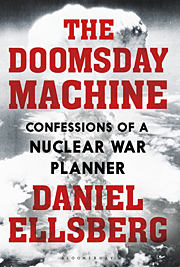We all know here what is going on with the US military, and surely the MSM journalists must know too, so why are they not concerned? Perhaps they are but are just hoping for the best. If they write the truth their editors will just throw it out, and if they keep writing the truth they will lose their jobs. I have sent to the editor of the Guardian and many of its journalists articles written by Paul Craig Roberts warning about Armageddon. I have sent lots of stuff off to George Monbiot but I have never had a reply. I just finished Daniel Ellsberg’s new book, The Doomsday Machine: Confessions of a Nuclear War Planner. Talk about hair-raising! Ellsberg, of course, is famous for leaking the Pentagon papers, which helped to end the Vietnam war and the presidency of Richard
Topics:
Mike Norman considers the following as important:
This could be interesting, too:
Robert Vienneau writes Austrian Capital Theory And Triple-Switching In The Corn-Tractor Model
Mike Norman writes The Accursed Tariffs — NeilW
Mike Norman writes IRS has agreed to share migrants’ tax information with ICE
Mike Norman writes Trump’s “Liberation Day”: Another PR Gag, or Global Reorientation Turning Point? — Simplicius
We all know here what is going on with the US military, and surely the MSM journalists must know too, so why are they not concerned? Perhaps they are but are just hoping for the best. If they write the truth their editors will just throw it out, and if they keep writing the truth they will lose their jobs. I have sent to the editor of the Guardian and many of its journalists articles written by Paul Craig Roberts warning about Armageddon. I have sent lots of stuff off to George Monbiot but I have never had a reply.
I just finished Daniel Ellsberg’s new book, The
Doomsday Machine: Confessions of a Nuclear War Planner. Talk about
hair-raising! Ellsberg, of course, is famous for leaking the Pentagon
papers, which helped to end the Vietnam war and the presidency of Richard
Nixon as well. But before Ellsberg worked as a senior adviser on the Vietnam
war, he helped to formulate U.S. nuclear policy in the late 1950s and early
1960s. His book is a shattering portrayal of the genocidal nature of US nuclear
planning during the Cold War – and that threat of worldwide genocide (or omnicide,
a word Ellsberg uses to describe the death of nearly everything from a nuclear
exchange that would generate disastrous cooling due to nuclear winter) persists
to this day.
4) When the atomic bomb was first tested in 1945, there were fears among the
scientists involved that the atmosphere could be ignited, ending all life
on earth. The chance was considered remote (perhaps 3 in a million), so the
scientists pressed ahead.
- Most Americans still don’t understand that even a smallish nuclear exchange involving a few hydrogen bombs could very well lead to nuclear winter and the deaths of billions of people on the earth (due to the widespread death of crops and resulting famine and disease).
- Despite the genocidal threat of nuclear weapons, the US is persisting in plans to modernize its arsenal over the next 30 years at a cost of $1 trillion.

